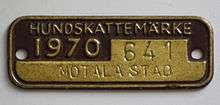Änglahund
Änglahund is a song written by Hasse Andersson, and recorded on his 1982 album with the same name.[1] Song lyrics asks the question if God allows people bringing their dog in to Heaven after death. The song has also been recorded with lyrics in English, as Angel Buddy.[2]
| "Änglahund" | |
|---|---|
| Song by Hasse Andersson | |
| Language | Swedish |
| Released | 1982 |
| Genre | country |
| Label | Sonet |
| Songwriter(s) | Hasse Andersson |

Song lyrics reflect a time when dog licence was used in Sweden.
The song was also dealt with during a meeting of bishops, where Christian leaders wondered how a non-religious song about the afterlife could make thousands of people listen, while priests in church had problems getting visitors despite dealing with the same issue.[3]
Song lyrics reflect a time when dog licence was used in Sweden.[4]
Other recordings
- Vikingarna recorded the song in 1983 on the album "Kramgoa låtar 11".[5] Their recording of the song also appears in the 2014 film The Anderssons Rock the Mountains, in a rather humorous way, by being played on the radio after the family worry about a dog that the main character Sune feels bad about having hit with a football.[6]
- Swedish rockband Kenneth & the Knutters recorded the song as "Änglabåge", replacing the dog theme with the motorcycle.
- Swedish musician and preacher Målle Lindberg also recorded the song.
In other languages
A Danish-language-version, Himmelhunden, was written by Calle Sand and became the 1984 breakthrough song for Teddy Edelmann.[7]
References
- Information at Svensk mediedatabas
- "Angel Buddy" (in Swedish). Svensk mediedatabas. 2000. Retrieved 5 July 2011.
- Palm Anders, Stenström Johan, ed. (1999). Barnens svenska sångbok. Bonnier.
- Frida Lindqvis (9 August 2000). "Man får ta hunden med sig in i USA" (in Swedish). Aftonbladet. Retrieved 5 July 2011.
- Information at Svensk mediedatabas
- "Sune i fjällen (2014)" (in Swedish). Svensk filmdatabas. 2014. Retrieved 13 September 2014.
- "Hhistorien om himmelhunden" (in Danish). Teddy Edelmann's website. Retrieved 2 June 2012.
This article is issued from Wikipedia. The text is licensed under Creative Commons - Attribution - Sharealike. Additional terms may apply for the media files.